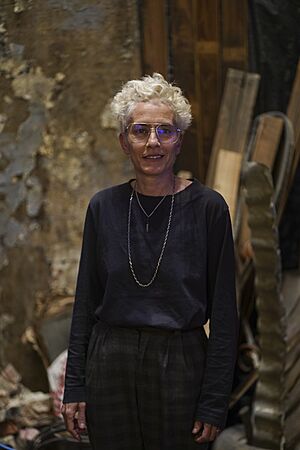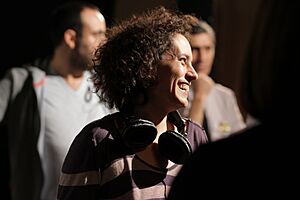Albertina Carri facts for kids
Quick facts for kids
Albertina Carri
|
|
|---|---|

Carri in 2024
|
|
| Born | 1973 Buenos Aires, Argentina
|
| Occupation | Filmmaker, writer, audiovisual artist |
|
Notable work
|
Los rubios/The Blonds Cuatreros/Rustlers Las hijas del fuego/The Daughters of Fire |
Albertina Carri (born in 1973, Buenos Aires) is an Argentine filmmaker and writer. She is known for being part of the New Argentine Cinema movement. Her films have been shown at many important festivals. These include Cannes, Berlin, Toronto, and Buenos Aires.
Throughout her career, she has explored different film styles. These include mystery stories, documentaries, and dramas. She uses various techniques like found footage and animation.
She was the artistic director for the first three years of Asterisco. This is Argentina's international LGBTIQ film festival. Albertina Carri has directed many short films, TV movies, and TV series. She has also made seven feature films. Some of her well-known films are Los rubios, Géminis, and Las hijas del fuego. She has also written books, including Los rubios: cartografía de una película and the novel Lo que aprendí de las bestias.
Contents
About Albertina Carri's Life
Albertina Carri was born in Buenos Aires in 1973. She still lives and works there today. Her mother, Ana María Caruso, was a literature professor. Her father, Roberto Carri, was a sociologist and writer. Both of her parents were part of a political group called the Montoneros.
In 1977, when Albertina was three years old, her parents were taken away. They disappeared during a difficult time in Argentina's history. This was when the country was under a military government. After her parents were taken, Albertina and her two older sisters exchanged letters with them for a while. Eventually, they lost contact.
Later, Albertina and her sisters moved to a family farm. Years later, she moved to live with other relatives in Buenos Aires. When she was 16, she lived with Alcira Argumedo. Alcira was a friend of her parents and a well-known sociologist. Alcira encouraged Albertina to study screenwriting in 1991.
In 2005, Albertina Carri met journalist Marta Dillon. They got married. With the help of their friend Alejandro Ros, they had a son named Furio. He was the first child in Argentina to be officially registered with three parents. Albertina and Marta's marriage ended in 2015.
In 2018, Albertina spoke in a trial about crimes that happened in a secret detention center. Her parents had been held there. The people accused were found guilty in 2019.
Albertina Carri's Film Career
Early Career: 1990s to 2010
Albertina started studying screenwriting when she was 17. For several years, she worked as a camera assistant. She worked with famous directors like María Luisa Bemberg. In 1998, she began working on her first feature film. It was called No quiero volver a casa (I Don't Want To Go Home). This film came out in 2000 and was shown at many festivals.
She also explored animation techniques. She made short films like Aurora and Barbie también puede estar triste (Barbie Can Also Be Sad). The latter won an award at the New York Mix Festival.
In 2003, her second feature film, Los Rubios (The Blonds), was released. This film made her one of the best directors of her generation. Los Rubios was shown in many countries and won several awards. These included the Audience Award at BAFICI. The film explores Albertina's memories of her parents. It uses different elements like photos and even toys to tell the story.
Her short film Fama (Fame, 2003) was part of a TV series called Mujeres en rojo. It was shown on Argentine television.
Géminis, her third feature film, was shown at the Cannes Film Festival in 2005. It was released worldwide. The story looks at the complicated relationships within a wealthy family in Buenos Aires. That same year, she directed an episode for the TV miniseries Numeral 15.
In 2007, Albertina co-directed the TV movie Urgente (Urgent). This drama dealt with difficult social issues. She also worked on the documentary series Fronteras argentinas. That year, she released a book about her film Los rubios. The book shared details about making the film. It also included letters written by her parents while they were held captive. The book was reissued in 2023.
Her feature film La rabia (The Rage, 2008) is a drama set in the countryside. It explores themes like relationships and life in nature. It won awards for Best Director at the Havana Film Festival and Monterrey Film Festival.
In 2009, she received a special award for her career at the Cinema Jove Festival.
Recent Work: 2010 to Present
In 2010, Albertina founded a production company called Torta with Marta Dillon. They produced a series of four documentaries called La bella tarea (The Beautiful Task). These films were about women's rights during childbirth. The series aired in 2012.
Also in 2010, she directed the short film Restos (Remains). This film explored memories and old films that were destroyed. It was part of a project to celebrate Argentina's bicentennial.
In 2011, Carri created a video installation for the Language and Book Museum. It was called Partes de lengua. This artwork thought about how different languages and traditions exist together in Argentina.
In 2012, Torta produced a TV program called Visibles. It was shown in Tierra del Fuego. That same year, Carri directed the popular 13-episode miniseries 23 pares (23 Pairs). This series explored themes of family and identity in Argentina's recent history.
From 2014 to 2016, she was the artistic director of Asterisco. This is an international LGBTIQ film festival in Buenos Aires.
In 2015, Carri created an exhibition called Operación fracaso y el sonido recobrado. It was at the Memory Park in Buenos Aires. The exhibition used videos and sculptures to help people think about the memories of difficult events.
In 2017, her fifth film, Cuatreros (Rustlers), was released. This film is a documentary that uses found footage. It was inspired by her father's research and a lost film. Cuatreros was shown at the Berlinale and won awards for best documentary. That year, she also presented a video installation called Animales puros.
The next year, she released her feature film Las hijas del fuego (The Daughters of Fire, 2018). This is a road-movie where the main characters go on a journey. They form different relationships along the way. It won Best Film at the BAFICI festival.
During the COVID-19 pandemic, she directed a short film for the Bitácoras series. In 2021, she released 2020: La delgada capa de la tierra. This documentary explores images and sounds of a landscape during that time.
In 2021, she published Retratos ciegos (Blind Portraits), a poetry book. She also published her first novel, Lo que aprendí de las bestias.
In 2022, she had an exhibition called Cine Puro (Pure Cinema) in Berlin. It showed how she uses film materials in creative ways. The same year, she published Las posesas, a book of essays she wrote with philosopher Esther Díaz.
In 2023, Carri released Palabras ajenas (The Words of Others). This film pays tribute to an artwork by León Ferrari. It uses video footage from the pandemic. Also in 2023, she released a short film about Uruguayan artist Luis Camnitzer.
In 2024, she received an award for her achievements in filmmaking from Argentine Film Directors. Her new feature film, ¡Caigan las rosas blancas! (White Roses, Fall!), was shown at the International Film Festival Rotterdam in 2025.
Albertina Carri's Films
Feature Films
| Year | Title | Credits |
|---|---|---|
| 2000 | No quiero volver a casa | Direction, screenwriting, production, camera operation |
| 2003 | Los rubios | Direction, screenwriting, production, camera operation |
| 2005 | Géminis | Direction, screenwriting, production |
| 2008 | La rabia | Direction, screenwriting, production |
| 2017 | Cuatreros | Direction, screenwriting, production |
| 2018 | Las hijas del fuego | Direction, screenwriting |
| 2025 | ¡Caigan las rosas blancas! | Direction, screenwriting |
Short and Medium-Length Films
| Year | Title | Credits |
|---|---|---|
| 2001 | Aurora | Direction, editing |
| 2001 | Barbie también puede eStar triste | Direction, screenwriting, production |
| 2001 | Historias de Argentina en vivo | Direction, screenwriting |
| 2004 | De vuelta | Direction |
| 2010 | Restos | Direction, screenwriting, production |
| 2021 | 2020: La delgada capa de la tierra | Direction |
| 2023 | Palabras ajenas | Direction, screenwriting |
| 2023 | Luis Camnitzer: Arte, estado y no he estado | Direction |
Television Series and Telefilms
| Year | Title | Credits |
|---|---|---|
| 2003 | Fama (episode from Mujeres en rojo) | Direction, screenwriting, production |
| 2005 | 0800 no llames (episode from Numeral 15) | Direction |
| 2007 | Urgente (telefilm) | Direction, screenwriting |
| 2007 | Tracción a sangre (episode from Fronteras) | Direction |
| 2011 | Visibles (series) | Direction, screenwriting, production |
| 2012 | 23 pares (series) | Original concept, direction, production |
| 2014 | La bella tarea (series) | Direction, screenwriting |
Albertina Carri's Books
Books She Has Written
- 2007: Los Rubios: cartografía de una película. Reissued in 2024.
- 2021: Retratos Ciegos (Poetry). Co-authored with Juliana Laffitte.
- 2021: Lo que aprendí de las bestias (Novel).
- 2022: Las posesas (Essay). Co-authored with Esther Díaz.
Albertina Carri's Influence
Albertina Carri's films are studied in schools and art programs in many countries. People look at her unique storytelling and artistic experiments. They also study the new and different ideas she brings to her films.
See also
 In Spanish: Albertina Carri para niños
In Spanish: Albertina Carri para niños


